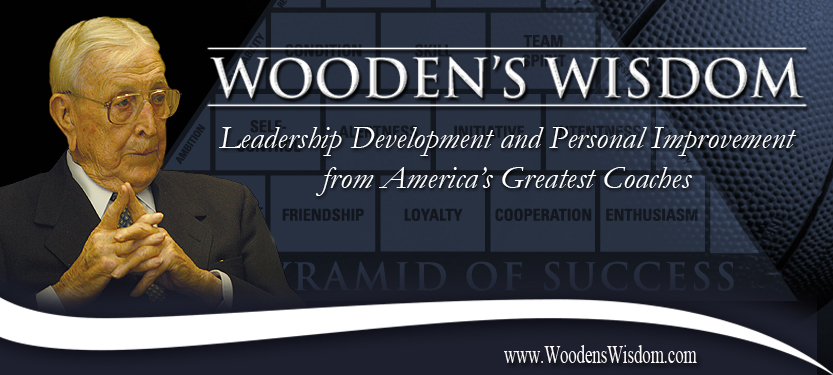 |
|
| Wooden's Wisdom - Volume 1 | Issue 49 |
| Craig Impelman Speaking | Championship Coaches | Champion's Leadership Library Login | |
|
The Coach as a Leader - Part 5 (Creating Initiative) The next block on the second tier of the Pyramid of Success, Initiative, is an essential quality for any leader and team if they are going to perform near to their capability.
Issue 21 discussed the importance of Initiative as a valuable individual character trait of a leader.
A great leader not only has initiative as an individual character trait but also coaches his or her team or organization in a manner that creates and encourages initiative from all team members.
A great leader creates new leaders.
Coach Wooden described the importance of giving his players the ability to take initiative this way:
Do not tie them down so rigidly that you take away their initiative. They must have some freedom of movement, but must react to the initiative of a teammate in order to keep floor balance.
Give players the opportunity to achieve without the fear of failure.
The communication style of the leader will either encourage or discourage initiative by the people he or she supervises.
In the book How to Be Like Coach Wooden by Pat Williams, Coach Wooden described his method this way:
I never wanted to teach through fear, punishment or intimidation. Pride is a better motivator than fear.
Fear may work in the short term to get people to do something, but over the long run I believe personal pride is a much greater motivator. It produces far better results that last for a much longer time.
The leader encourages initiative when he holds people accountable and corrects rather than criticizes.
In his book with Jay Carty Coach Wooden One-on-One, Coach Wooden describes the difference this way:
Criticism and correction differ especially when it comes to methods and motives. Criticism puts someone down. Correction means I want to help.
Be slow to correct and quick to commend. No one likes correction, but we learn from it. If we commend before we correct, the person will accept the correction better. But we must listen before we correct. There is usually another side to every story. If we listen to others they will be more apt to listen to us.
It is very important how correction is given. We must be careful how we do it. We don't want those being corrected to lose face. Here are some good tips: make it meaningful, but use judgment. Don't fly off the handle and be quick to correct. Do it with tact. If we just let fly, it is more likely to be viewed as criticism than as correction.
Approval is a greater motivator than disapproval, but we have to disapprove on occasion when we correct. It's necessary. I only make corrections after I have proved to the individual that I highly value them. If they know we care for them, our correction won't be seen as judgment. I also tried to never make it personal.
The leader who encourages initiative has faith in people. He believes in them, and thus draws out the best in them.
A "Monday Morning Quarterback" leader stifles the initiative of his or her team members.
If the Initiative of the team member works out, the leader gives away the credit. If it doesn't, the leader takes the blame.
As Coach would often remind us: “It's amazing how much can be accomplished if no one is concerned with who gets the credit.”
Yours in coaching,
Craig Impelman www.woodenswisdom.com
Twitter: @woodenswisdom
|
WHY WORRY
“There are really only two things
to worry about—whether
you are a success
or whether you are a failure.
If you are a success, there was
no cause for worry
and, if you are a failure—
There are only two things
to worry about--
whether you have your health
or whether you do not
have your health.
If you are healthy, a healthy
person certainly should
not worry and, if you do
not have your health—
There are only two
things to worry about--
whether you regain your health
and get well or whether
you fail to regain your health
and pass on.
If you regain your health
there was no cause for worry
and, if you fail to regain
your health and pass on—
There are only two things
to worry about—
whether you will go
to the place where we
all hope to go or whether you will go to that other place.
If you go to the place
where we all hope to go
you certainly should not
have worried and,
if you go to that other place—
You are going to be with
all of your friends and
the people here, so why worry.
Anonymous
|
|
For more information visit www.woodenswisdom.com |
|
© Copyright 2024 WoodensWisdom.com | # of Times Wooden's Wisdom Issues Opened: 6,737,209
Hosting & Design by:EverydayWebDesign.com